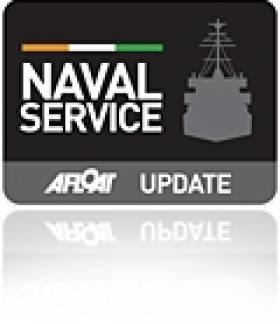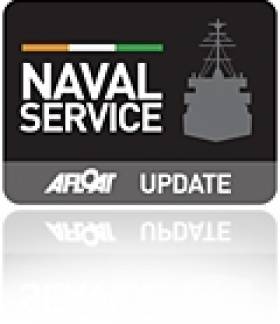Displaying items by tag: LESamuel Beckett
L.E. Samuel Beckett On Way after Builders Sea-Trails
#LEsamuelBeckett – Yesterday The Irish Times reported that the Irish Naval Service new €50 million offshore patrol vessel, LE Samuel Beckett (P61) is to sail in to Cork Harbour this morning (Wednesday 30 April) and welcomed to join the fleet at the Haulbowline Naval Base.
The ship, built by Babcock Marine at Appledore in Devon, has been undergoing sea trials for the past few months but last night the Naval Service took ownership of the vessel and its captain, Lt Cmdr Ken Minihane and his crew of 45, headed for Cork.
The ship will spend about a week at Haulbowline being fitted out with a number of armaments before sailing for Dublin, where a special commissioning ceremony is due to take place beside the Samuel Beckett Bridge on May 17th. Click for more on this story.
#OPVnewbuilds – L.E. Samuel Beckett, the first of a pair of newbuild OPV vessels under construction for the Naval Service was floated-out earlier this month from a north Devon shipyard, writes Jehan Ashmore.
As previously reported on Afloat.ie, the floating-out of the newbuild OPV PV90 class (enhanced Roisin-class) was deferred to this month. Originally it was planned to have taken place the proceeding month from Babcock Marine's shipyard in Appledore.
L.E. Samuel Beckett is expected to be delivered by March 2014. She is a direct replacement of the former L.E. Emer whose adopted 'homeport' was Cork City. Speculation as to if the newbuild will take her predecessor's homeport remains the decision of the Department of Defence.
Yesterday the 'Emer' departed the Naval Base on Haulbowline Island to nearby Cork Dockyard where her owners, Uniglobe Group are to upgrade the vessel for her new role in the Niger Delta.
The 89m L.E. Samuel Beckett is to be followed by the second OPV L.E. James Joyce and likewise this newbuild is to be delivered a year apart in early 2015.
As previously reported in May 2012, senior representatives of the Naval Service and the Department of Defence attended the ceremony at the UK shipyard which won the €99m contract in 2010 to build the pair. Notably the PV90's are to feature drones or "unmanned aerial surveillance vehicles" and robotic submersibles.
The same shipyard near Bideford, also built sections for the first of a pair of new Royal Navy QE-class aircraft-carrier, HMS Queen Elizabeth. On Monday the final module of the 'ski-ramp' for the ship's massive hull was slotted into place at Babcock Marine's Rosyth dockyard.































































